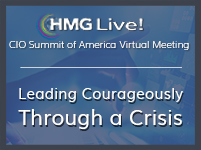Your cart is currently empty!
Pivoting to the New Realities of Work and Business: Flexible Leadership Required to Manage Intensive Transformation and Rapid Change

As the COVID-19 pandemic continues to upend our professional and personal lives, we’re quickly developing new ways to work around the impacts of the crisis. The pandemic is truly the ultimate test of our leadership abilities, and I am deeply grateful for our strong global network of engaged and committed technology leaders.
Thanks to the support of our network and the dedication of our incredible team here at HMG Strategy, we are making the pivot to a fully-enabled digital conference model. We will continue providing unique insights from world-class leaders, delivered to you in a series of frequent virtual briefings, webinars and summits.
We currently offer three distinct virtual broadcasts: HMG Virtual Briefings, HMG Webinars and HMG Virtual Summit Meetings, which extend the thought leadership of top-tier tech executives from the HMG Strategy community for each of our regional markets.
Last Thursday, we held HMG Live! The 2020 CIO Summit of America Virtual Meeting, a 90-minute online conference featuring an amazing panel of brilliant and highly experienced technology leaders and executives. Our participants included Nicole Eagan, CEO at Darktrace; Brian A. Hoyt, CIO, Unity Technologies; Ralph Loura, SVP, CIO at Lumentum; Harry Moseley, Global CIO, Zoom; Wendy M. Pfeiffer, CIO, Nutanix; Steve Phillpott, CIO, Western Digital; Bhavin Shah, CEO and Founder, Moveworks; and Angela Yochem, EVP, CDTO, Novant Health.
We will provide full coverage of the virtual summit in upcoming articles. Meantime, I want to share brief portions of the genuinely valuable insights offered by our panel of experts:
WENDY M. PFEIFFER: The biggest lesson for me over the last two weeks is how to help people create structure when they are working completely remotely. The knee jerk reaction is to feel like it’s an emergency and to work 24/7. But that will exhaust people. So, what I’ve done with my team and we’ve since rolled it out to many employees in the company is that I’ve asked people to block out their work hours so that they can be available to help their kids with homework or if they need to take a walk.
What we discovered is that when we didn’t force people to fit into traditional work hours, we found more capacity for people to be available for extended hours in exchange for taking some hours to being available for their families. I’m encouraging people to do this. Even creating that schedule week by week is extremely helpful from a psychological standpoint.
I see each member of our C-suite not only connecting with each other but also reaching out to schools and their communities to help them to connect during this crisis.
STEVE PHILLPOTT: This over rotation to working remotely will forever change our work environments and we’re not going to return to work as it was before.
As we manage through times of crisis, it accentuates the importance of communication and the robustness of our communication and collaboration tools. Now more than ever, communication is critical, and we need to communicate more than you think you need to, and we need to seek out new forms of collaboration. As we’re working remotely, we need a robust set of tools that can scale. On our side, we’ve seen a 3-5X increase in collaboration tool capacity in days, so the ability to scale quickly is critical … IT must serve as a role model to the rest of the company as a remote workforce.
BHAVIN SHAH: Each of us are working remotely and we’re seeing increased demand for IT services, including a 2X increase in overall IT support ticket volumes.
Every walk-up help desk in America is vacant – they can’t be used. So, we’re seeing a 3X increase in demand coming through the chatbot using these digital channels. Systems and access have gone through the roof … we’re seeing greater demand for automation, to use AI and machine learning to resolve support issues. And this shift to remote workforces has become a semi-permanent thing that America and the world is experiencing.
And while many of us will eventually return to the office, we’ll gain a deeper appreciation of what it takes to provide that type of support remotely and digitally.
This crisis has become a transformational event in our lives and careers. As technology leaders, we definitely have the strengths and experiences required for handling periods of turbulence and uncertainty. As a group, we have a unique view of complex transformational processes. We know how to get things done and we’re not afraid to tackle hard problems. Together, we will prevail and emerge stronger.


